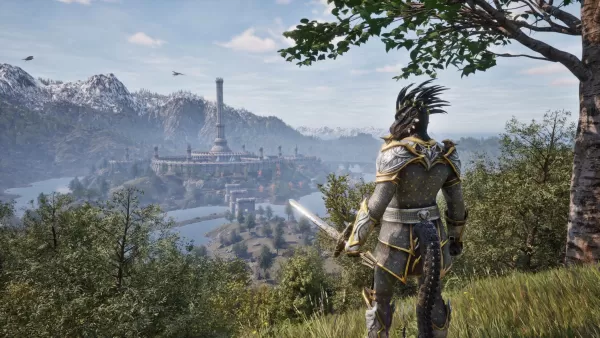By Azura, by Azura, by Azura – the rumors were true. Yesterday, Bethesda sent the internet into a frenzy by finally unveiling Virtuos’ remaster (or is it really a remake?) of The Elder Scrolls IV: Oblivion. An ‘Elder Scrolls Direct’ of sorts culminated in the surprise shadow-drop, which instantly transformed into hundreds of thousands of concurrent players. This moment of global hype and celebration feels like a much-needed beacon amidst the recent challenges Bethesda Game Studios has faced. From years of damage control following Fallout 76’s rocky launch to the lukewarm reception of their new sci-fi universe, Starfield, the studio’s latest releases have left many fans wondering: Has Bethesda lost its touch? The RPG landscape has grown increasingly competitive, with Larian Studios’ Baldur’s Gate 3 and Obsidian’s The Outer Worlds franchise both earning critical acclaim as spiritual successors to Elder Scrolls and Fallout. While Elder Scrolls 6 and Fallout 5 remain years away, this re-release of Oblivion might be the first step in the right direction – albeit not the one fans might expect.
At its peak, Bethesda Game Studios was the undisputed leader in the RPG genre. In 2020, leaked Microsoft FTC documents revealed that Fallout 4 had sold an impressive 25 million units to date, with over 5 million units sold in its first week alone according to VGChartz. In 2023, Todd Howard announced that Skyrim had crossed the monumental threshold of 60 million sales, though multiple re-releases certainly played a role in that figure. Starfield, on the other hand, has only managed to sell just over three million units a year-and-a-half post-launch. Considering the boost from Game Pass subscribers and the absence of a PlayStation version, this is likely a disappointment for Bethesda. Even the dedicated Starfield fanbase, smaller than that of The Elder Scrolls or Fallout, has expressed dissatisfaction with the game’s first expansion, Shattered Space.
This situation presents a significant challenge for the developer. With The Elder Scrolls 6 still "years away" and Fallout 5 barely a whisper in the studio's halls, how can this once-iconic RPG developer rekindle the magic for its fanbase? The answer may lie in revisiting its storied past.
Rumors of an Elder Scrolls IV: Oblivion remaster surfaced in September 2023, when leaked Microsoft documents hinted at several unannounced Bethesda titles, including a remaster of the 2006 classic (alongside another intriguing remaster – more on that later). Silence prevailed until January 2025, when a former Virtuos employee spilled more details, sparking debates among Elder Scrolls fans about the authenticity of the leaks, reminiscent of the Stormcloaks vs. the Imperials divide. Finally, last week, the floodgates opened (perhaps prematurely), igniting the internet – there were over 6.4 million Google searches for ‘The Elder Scrolls IV: Oblivion’, a 713% surge in the last week alone. At its peak, Bethesda’s reveal livestream attracted over half a million viewers. Despite the leaks (or possibly because of them), more than 600,000 people tuned in to witness the re-reveal of a 19-year-old game. The intense demand to play the remaster caused discount game key websites like CDKeys to crash, while Fanatical and Green Man Gaming experienced slowdowns. As of yesterday, Steam reported 125,000 concurrent players, with the game firmly positioned as the #1 best seller. The enthusiasm Bethesda fans have for Oblivion burns as brightly as the flames pouring from the Oblivion gates themselves.
The message from players is clear: if you (re)build it, they will come. What better way to keep fans engaged and invested during these long development periods than to invite them to revisit the mysterious isles of Morrowind or the post-apocalyptic landscapes of the East Coast? From a commercial perspective, this strategy is a no-brainer. While Bethesda’s main development team focuses on their long-term projects, trusted partners like Virtuos can use historical blueprints to craft remasters in shorter time frames. These remasters target games with established audiences, many of whom are experiencing their first real RPGs of their generation. By restoring these classics, Bethesda not only rekindles nostalgia but also introduces a new generation to the intricate world of Tamriel or the post-apocalyptic ruins of Las Vegas and D.C.
Bethesda has previously leveraged its catalog strategically. During the first season of the Fallout TV show on Prime Video, Fallout 4 was discounted by up to 75%, accompanied by a timely next-gen update that included homages to the show. As a result, Fallout 4 sales soared by over 7,500% in Europe alone, despite being nearly a decade old.
 Oblivion Remastered offers a visit to the past that looks like the future. Image credit: Bethesda / Virtuos
Oblivion Remastered offers a visit to the past that looks like the future. Image credit: Bethesda / Virtuos
Looking back at Microsoft’s leaked Bethesda roadmap, many noted a planned Fallout 3 remaster following Oblivion two years later. It's worth mentioning that the timelines from the original presentation have shifted – Oblivion was originally slated for fiscal year 2022. However, if the original gaps hold true, a Fallout 3 remake might be on the horizon for 2026 – conveniently aligning with the second season of the Fallout TV show, which shifts its focus to New Vegas. While a Fallout remaster now seems inevitable, given the show's direction, could Bethesda’s early discussions with showrunners Graham Wagner and Geneva Robertson-Dworet hint at a surprise New Vegas remake? Given the synergy between the first season of the show and Fallout 4’s aesthetics, could Bethesda elevate its strategy even further for the New Vegas-focused second season? They shadow-dropped Oblivion – it’s not beyond the realm of possibility that a New Vegas Remastered trailer awaits us at the end of Fallout Season 2’s finale.
The message from players remains clear: if you (re)build it, they will come. However, if there’s one game in Bethesda’s catalog that truly deserves a remake, it’s The Elder Scrolls III: Morrowind. For years, many Elder Scrolls fans have passionately advocated for this, with some dedicated fans even remaking Morrowind using Skyrim’s tools, akin to Skyblivion. However, Morrowind presents unique challenges. It stands at the crossroads of Bethesda’s evolution as a studio – built differently from what we now recognize as an Elder Scrolls game. It's only partially voiced, with most of the story conveyed through text, no quest markers (players must manually note directions from NPCs unless they have perfect recall), and combat physics that are essentially non-existent. While Virtuos successfully modernized some of Oblivion’s more cumbersome systems, Morrowind is inherently a complex system. This is part of what makes it beloved, but it also complicates the remaking process. Remaking Morrowind is a delicate balancing act: modernize it too much and you risk losing the original charm; retain too many outdated elements, and it could feel worse than an intense skooma hangover.
When a studio becomes the icon of a gaming sub-genre, the challenge is to innovate and evolve while retaining their audience. Rockstar Games has kept Grand Theft Auto fans engaged for over a decade through the ever-expanding world of GTA Online, which in turn fuels the rumored hefty budget for GTA 6. Bethesda’s strength lies in crafting richly detailed, expansive single-player worlds – a formula that Elder Scrolls Online and Fallout 76 have struggled to replicate. However, the overwhelming response to Virtuos’ Oblivion remaster demonstrates that gamers are eager to revisit the historic annals of Elder Scrolls. That’s not to say every remaster is guaranteed success – this particular one is the result of careful consideration and skilled development. A less polished remaster might have been met with a different reception, as seen with Rockstar’s GTA Definitive Editions. But what better way for the former king of modern RPGs to regain its footing than by breathing new life into its beloved classics?








